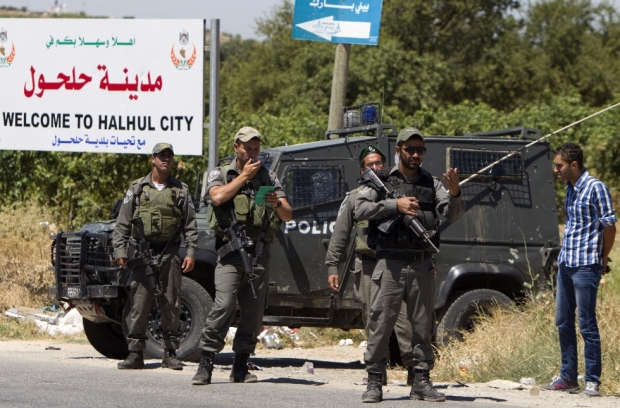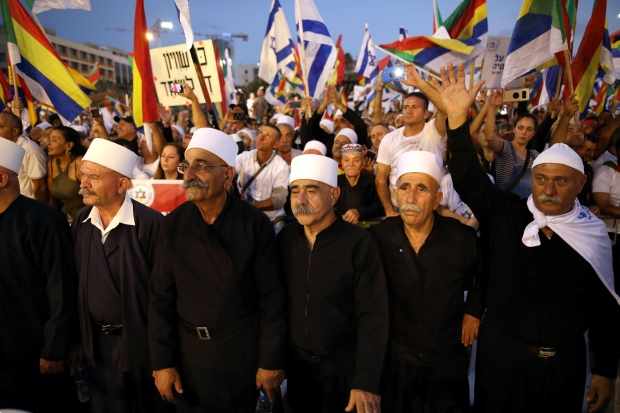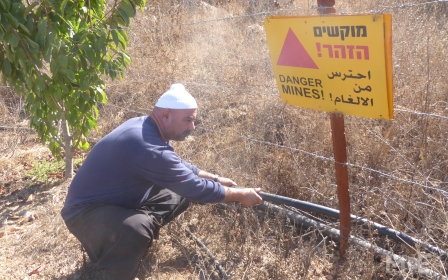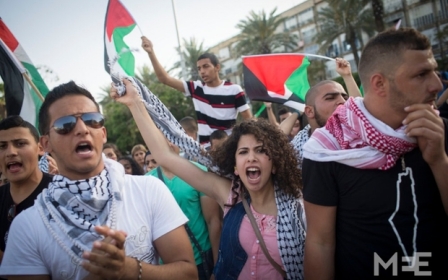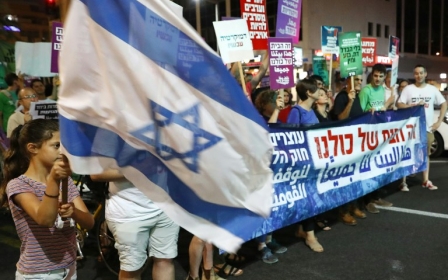Resigned Knesset member: Jewish nation-state law is 'ethnic cleansing'
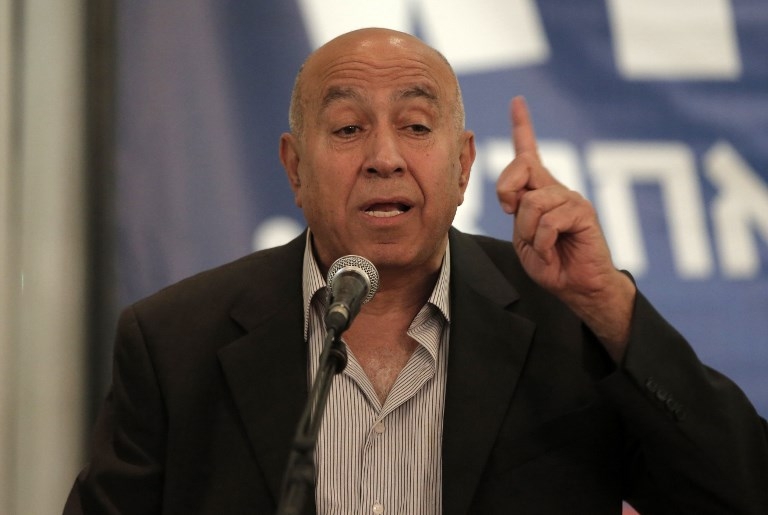
A Knesset member who resigned in protest over the Jewish nation-state law says the legislation "normalises and enshrines in law" the superiority of Israeli Jews over their Arab peers, and warned of a limit to what the Arab community in Israel will tolerate.
Zouheir Bahloul, 67, a popular sports commentator turned politician who represented the Zionist Union, quit the Knesset on 28 July following the passage of the law last month, which declared Israel to be the nation-state of the Jewish people.
In an interview with Middle East Eye, Bahloul said that after three years in parliament, he was moved to quit over a law he says institutionalises the “inferior status” long experienced by Arab citizens of Israel.
'My resignation is an outcry that we will not accept laws that chase the Arab presence in this country'
- Zouheir Bahloul
"My resignation is an outcry that we will not accept laws that chase the Arab presence from this country,” he said.
“Our legal status after this law is inferior because the law normalises and enshrines Arab inferiority and Jewish superiority through a basic law that has the authority of a constitution [to] which the High Court can hardly object.”
The nation-state law also describes Jewish settlement building as being in the Israeli national interest and declares Hebrew as the national language, with Arabic granted only a special status.
It makes no mention of equality nor democracy, implying that the country's Jewish character takes precedent over Palestinians, Druze and Circassians in Israel.
Critically, the law is part of the country’s so-called Basic Laws, which act as a de facto Israeli constitution and would require Israel’s High Court of Justice to be overturned.
Bahloul, who was born in Israel into a Muslim Arab family, described the law as "unprecedented" and said it has crossed many red lines for Arab citizens of Israel.
He is particularly critical about the absence of the word equality from the law, which he sees as one more attempt in a long history of legislation aimed at expelling Arabs from the country.
"In the past, chasing the Arab minority in Israel was in the form of policies, heated statements and shortages in financial budgets for Arab towns, but it was not a basic law that has a constitutional power,” Bahloul said.
He added: "There is ethnic cleansing in this law that allows building Jewish-only towns without any Arabs. This is more than what the Arabs could absorb. All of that comes over human rights".
'The ability of the Arab minority [in Israel] to be silent, patient and endure these laws is a limited ability'
- Zouheir Bahloul
Bahloul’s comments come as Palestinian Israeli leaders petitioned the High Court this week to overturn the law. A mass march on the Knesset headquarters in West Jerusalem is expected on Wednesday.
Despite holding Israeli citizenship, Palestinians in Israel lived under a military administration between 1948 and 1966 and faced curfews, severe restrictions on free speech and political rights, and persecution in front of military courts. Rather than being referred to as Palestinian citizens of Israel, they are often called "Arabs" or "Arab Israelis".
There are around 1.6 million Palestinian citizens of Israel today, making up 20 percent of the country's population. Many have been left unsurprised by the new law, which they see as simply making official what they have felt for decades: that they are second-class citizens compared to their Israeli peers.
Still, warned Bahloul, there is only so much that can be tolerated. "The ability of the Arab minority [in Israel] to be silent, patient and endure these laws is limited... I am not trying to scare anyone here, but if this violent campaign against Arabs in the form of laws continues, I think there will be a possibility for the creation of new facts,” he said, without elaborating.
'Accept the bits and pieces'
In December 2014, Bahloul made the unusual and controversial step of joining an Israeli political party – Labor - rather than joining one of the Arab parties that forms the Joint List, a coalition in the Knesset that represents the voices of Palestinians inside Israel.
That same month, the Israeli Labor Party, led by Isaac Herzog, and Hatnuah, the liberal party headed by Tzipi Livni, formed the centre-left Zionist Union.
'When a Knesset member rebels in such a way, they get angry and they start to tell us 'accept the bits and pieces of democracy that we offer you''
- Zouheir Bahloul
Bahloul told Haaretz earlier this month that he was “disgusted” by the coalition’s new name, but had to accept it because it was a “done deal”. In January 2015, he secured a parliamentary seat.
By the time Bahloul joined the Knesset, the nation-state law had already been languishing for three years after it was first proposed in August 2011. Only seven years later has the political landscape become ripe for its passage – and also for the pushback against it.
In February, MKs Dov Khenin and Yousef Jabareen of the Joint List sponsored a bill titled "Basic Law: Democratic, Multicultural and Egalitarian State" in the Knesset. The bill aimed to oppose the nation-state law. Israel, it suggested, should be a state for all citizens, and should modify its flag and national anthem to reflect the culture of its Arab citizens.
Bahloul’s critics have said that, regardless of the new law, his resignation was expected because he was isolated in the Zionist Union and had a tense relationship with its leader, Avi Gabbay. But Bahloul rejects their criticism as mere defensiveness.
"I had people who were supportive of my resignation within the Israelis, and vice versa,” he said.
“The minister of education [Naftali Bennett] said that 'the Knesset won't cry over Zouheir Bahloul'. When a Knesset member rebels in such a way, they get angry and they start to tell us 'accept the bits and pieces of democracy that we offer you'."
Palestinian-Druze alliance?
Bahloul’s resignation was one of the most high-profile reactions against the law, along with three Druze soldiers who made headlines when they announced on social media that they would stop serving in Israel’s army in protest.
Over the past few weeks, Bahloul has been outspoken about the need for Arab and Druze citizens of Israel to work together against the law.
The Druze, a religious sect within Islam that has had a presence in the Levant since the 11th century, number about 110,000 in northern Israel, with another 20,000 in the Israeli-occupied Golan Heights.
Israel's Druze community has strongly criticised the legislation as they have been subject to compulsory service in the military or police since 1956. Druze in the Golan Heights do not serve in the army and many have refused Israeli identity cards since the beginning of the occupation during the 1967 war.
Israeli Prime Minister Benyamin Netanyahu summoned the Druze leadership to Tel Aviv on 2 August to offer a new benefits package and a law highlighting their unique status in the country.
The meeting failed after Netanyahu walked out angrily, according to the Times of Israel. A Druze general and brigadier in the Israeli army, Amal Asad, had allegedly irritated Netanyahu when he told him that Israel is on the path to turning into an "apartheid state".
Asad later denied that he made such a comment, but affirmed that he wrote similar sentiments on his Facebook page a while ago.
'Netanyahu made a crack within the Druze and the gap between the rebelled Druze youth and their classical leadership headed by Sheikh Mowafaq Tarif is widening'
- Zouheir Bahloul
On 4 August, tens of thousands of Druze in Israel and their supporters gathered in Tel Aviv's Rabin Square to protest against the new law.
"There are Druze who think that the complete solution for the nation-state law is not money and budgets or a law that gives them a special legal status, but the solution is dignity and equality without begging for it," Bahloul said.
He described the youth within the Druze community who have rebelled and refused to serve in the Israeli army as "radical", and said the "blood alliance" between the Jews and Druze has failed.
"Netanyahu made a crack within the Druze and the gap between the rebellious Druze youth and their classical leadership, headed by Sheikh Mowafaq Tarif, is widening," he said.
Druze citizens make up less that 2 percent of Israel's population. They have three members in the Knesset and a minister of communications, Ayoob Kara, serving in the government. Palestinian citizens of Israel have 15 Knesset members but do not hold any ministries.
"There is a sympathy among Israelis with the Druze because they serve in the army. But the recent rebellion of the Druze soldiers shook the country because what links Jews and Druze in Israel is the army," Bahloul said.
He added that it is too early to judge what the near future holds.
"The nation-state law harms both the Arab and Druze inside Israel,” he said. “The Druze for years split from the struggle as if their issue is separated from the Arab issue inside Israel. Now, they are starting to realise that they made a mistake."
This article is available in French on Middle East Eye French edition.
Middle East Eye propose une couverture et une analyse indépendantes et incomparables du Moyen-Orient, de l’Afrique du Nord et d’autres régions du monde. Pour en savoir plus sur la reprise de ce contenu et les frais qui s’appliquent, veuillez remplir ce formulaire [en anglais]. Pour en savoir plus sur MEE, cliquez ici [en anglais].


